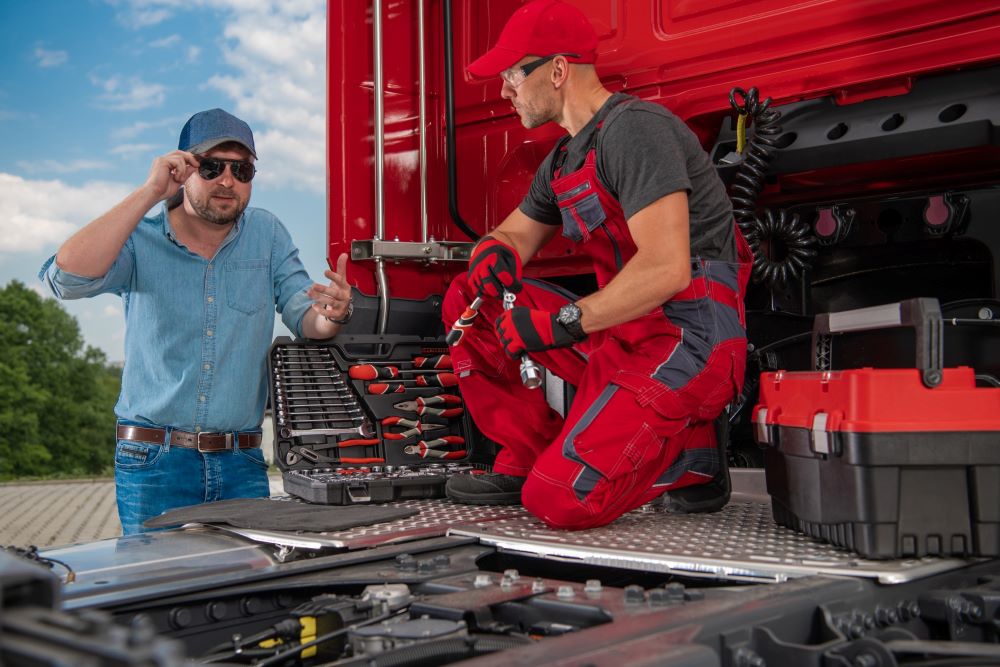
There’s a reason over 1.4 million truck drivers work in the U.S.—truck driving is one of the most lucrative careers available. To help you succeed in this field, we’ve compiled the top tips for new truck drivers. With a positive attitude, the right mindset, and essential skills, you can take advantage of the substantial financial rewards and numerous opportunities for growth, quickly advancing in your career.
If you’re a new truck driver looking to set yourself up for long-term success in the trucking industry, you’ve come to the right place. Read on to learn how to navigate the challenges you might face during your first few months and thrive in your new role.
Driving Techniques
Mastering the correct truck-driving techniques will make it easier for you to perform your duties. Some key areas to focus on to ensuring you have the right skills for the job include:
Understanding the Vehicle
Know your vehicle and how to handle it, especially in tight spaces. What type of truck are you driving? How long is it, and how much does it weigh?
Some combination vehicles are long and heavy, making them difficult to turn. Many new truck drivers overlook this and get frustrated during their first few months. To get accustomed to driving or parking large trucks, keep these tips in mind:
- Swing wide when making a turn to avoid hitting street signs, power poles, or ending up in a ditch.
- Pay close attention to low clearance and weight warnings. A wrong turn could lead you to a bridge that’s too weak or too low for your vehicle. If this happens, stop, turn on your flashers, and call local law enforcement for guidance.
- Practice backing up, especially at truck stops. If unsure, always get out and look (G.O.A.L). Take your time and don’t worry about other drivers waiting. This will help you avoid backing into other vehicles or people and the liabilities that come with such incidents.
Also, having a CDL (Commercial Driver’s License) may not be enough. Some types of trucking require additional certifications. Ensure you always have the correct CDL training and certifications needed for the job.

Efficient Route Planning
Proper trip planning is key to becoming an efficient truck driver, which directly affects your earnings. Learn to use your truck’s GPS and navigation tools effectively. Know the locations of truck and rest stops along your routes, and plan refueling to maximize driving time.
Always check the road and weather before your trip and adjust your route if needed.
Handling Different Road Conditions
A major stressor you’ll encounter in your career as a truck driver is changing road conditions. To manage stress effectively, familiarize yourself with the skills necessary to navigate various weather conditions, such as rain, snow, and fog.
A few crucial tips to keep at the back of your mind when navigating winter conditions include:
- Increase the following distance significantly.
- Apply brake pressure evenly and steadily.
- Always carry chains
- Except in emergencies, keep off the shoulder – other drivers might think you’re on the road, even if you’re well parked with your taillights on, because of low visibility.
Vehicle Maintenance
Part of your truck driving job involves routine vehicle inspections and maintenance, such as:
Daily Pre-Trip Inspections
A proper pre-trip inspection helps you catch and deal with minor issues before they become significant problems. This should include:
- Conducting a walk-around inspection to ensure all tires and wheels are in good condition
- Confirming that the headlights, auxiliary lights, plus four-way flashers are operational and not broken
- Checking the turn signals and stop lights
- Inspect the engine compartment. Be keen to check the fluid levels and look for signs of leaks. This is crucial to avoid damages, which are often costly to repair.
- Inspect the interior compartment and adjust the seat plus mirrors to minimize blind spots and maximize visibility.
- Air-brake system check

Routine Maintenance
Stay on top of your truck’s routine preventative maintenance schedule. This includes regular oil changes, filter replacements, tire rotation, and brake inspections.
Also, don’t ignore seasonal maintenance to factor in changing climatic conditions. During hot weather, ensure your air condition, coolant, electrical system, and tire pressure are well-maintained. And in cold weather, ensure your defrosters, braking system, and tire treads are up to par.
Remember to keep up-to-date records of all maintenance activities. They’ll come in handy if you ever need to provide proof of your truck’s condition during a claim.
Emergency Repairs
Because of the unpredictable nature of the open road, it’s wise to have some tools for handling minor repairs while you’re on the road. Veteran truckers always carry a toolkit with a combination of essential truck repair tools.
Safety Practices
Always put safety first throughout your truck driving career. You can do so in the following ways.
Adhering to Traffic Laws
Adhering to traffic laws is crucial for success in your trucking career. Understand and follow truck-specific speed limits and regulations to avoid tickets that can harm your driving record.
Pay attention to road signs, use turn signals and hazard lights properly, and always wear your seat belt for safety.
Load Securement
Improperly secured cargo is dangerous to you and other motorists as it can cause the tractor-trailer unit to jackknife or roll over. Be keen to use load securement devices fit for your truck and cargo to secure your load firmly. Also, perform regular checks on load stability during the trip to ensure all is well.

Fatigue Management
Get enough sleep between shifts and take adequate breaks while on the road to stay alert and avoid driving when tired. Staying alert behind the wheel is essential for your safety and the safety of other road users. FMCSA provides strict hours of service regulations all truck drivers must follow to ensure they get enough rest.
Defensive Driving
Most experienced truck drivers practice defensive driving for enhanced safety. Some essential defensive truck driving techniques you should consider as a new truck driver include:
- Maintaining a safe following distance
- Being aware of other drivers’ actions
- Avoiding sudden or unnecessary lane changes
- Avoiding distracted driving and keep your eyes on the road to remain alert for any emergencies that may develop
Practice Work Zone Safety
Exercise extra caution in work zones, which pose hazards like moving workers, equipment, sudden stops, lane shifts, and uneven surfaces. Slow down, maintain extra following distance, adhere to work zone signals, watch for flag crews and workers, and scan ahead for shifting traffic patterns.
Health and Wellness
Prioritize your health and wellness while on the road by following the tips below
Healthy Eating on the Road
To succeed as a truck driver long-term, prioritize your health. Avoid fast food and sugary drinks; opt for meals rich in iron, omega-3s, protein, and fiber. Stay hydrated to prevent mental fatigue and maintain a focus on the road.

Exercise Routines
Sitting behind the wheel for long hours causes several physical health issues, including chronic back pain and other musculoskeletal problems. Exercise regularly to keep fit and avoid these problems. Simple exercises in or around the truck will do as long as you’re consistent.
Mental Health
Being away from friends and family for an extended period can take a toll on your mental health. Avoid isolating yourself and socialize with other drivers to cope with loneliness and other on-the-road stressors. Also, stay connected with family and friends through regular video chats or phone calls to promote your mental health.
Sleep Hygiene
Your cab is your second home. Keep it clean and create a comfortable sleep environment to enhance sleep quality. Consider getting warm sleeping gear, including a weighted blanket, nice sheets, and a high-density mattress.
Conclusion
Like all new jobs, truck driving requires a learning curve.
The tips we’ve shared are insights from experienced company drivers and owner-operators who were once new truckers in a similar position to yours. If you follow them correctly, you’ll have a smooth start and can achieve the career goals you’ve set.
One last tip – be selective of the trucking company you work for, and don’t job-hop during your early days. It will prevent you from getting better jobs later on.
If you’re starting as an owner-operator and need help purchasing your first truck, reach out to Mission Financial Services. We offer flexible commercial vehicle loans for first-time buyers and can help you start your trucking business without breaking the bank.


